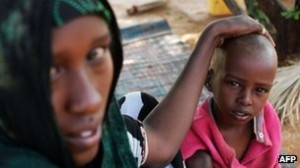 The UK government is being urged to stop Barclays closing the last account in Somalia which allows its citizens overseas to send money back home.
The UK government is being urged to stop Barclays closing the last account in Somalia which allows its citizens overseas to send money back home.
A group of aid practitioners said the service was a “lifeline” for an estimated 40% of the Somali population which rely on the transfers.
There are an estimated 1.5m Somalis living overseas.
Barclays told Dahabshiil the move was “a commercial decision due to the risks of the sector in which you operate”.
“The decision to exit our business relationship with you is not a negative reflection of your anti-money laundering standards, nor a belief that your business has been unwittingly been a conduit for financial crime,” Barclays wrote in a letter sent to Dahabshiil.
Barclays is the last major British bank to still provide such money transfer services in Somalia.
The letter signed by more than 100 researchers and aid workers states that its plan to close its account with Dahabshiil – the largest money transfer business providing services to Somalia – on 10 July will cause a crisis for the families that rely on the transfers.
Abdirashid Duale, chief executive officer of Dahabshiil, said Barclay’s decision could see money transfers pushed underground into the hands of “unregulated and illegal providers”.
“Barclays’ decision to terminate its relationship with Dahabshiil results from changes in Barclays eligibility criteria, which have affected a large number of Barclays’ customers in the Money Service Business sector, including Dahabshiil,” Mr Duale added.
Six-month extension
The letters signatories want the UK government to ask Barclays to extend its termination deadline for at least six months.
They also said they wanted the UK government to assist Somali money transfer businesses in finding alternative banking partners, as well as help the businesses develop the enhanced due diligence required by banks.
The group estimates that almost three quarters of Somalis who receive funds from overseas use it to pay for basic food, education and medical expenses.
It says one third of those who receive funds would not be able to afford basic food if the transfers are stopped.
The UK Serious Organised Crime Agency has identified money service businesses generally as a potential money laundering risk.
And all international banks have been tightening rules in a bid to cut money laundering and funding of groups accused of terrorism.
“Some money service businesses don’t have the proper checks in place to spot criminal activity and could therefore unwittingly be facilitating money laundering and terrorist financing,” Barclays said in a statement.
The bank emphasised that it was “very happy” to serve companies with strong anti-financial crime controls.
Lifeline
The Somali Money Services Association (SOMSA), an umbrella group of transfer services, said the closures would “have dire consequences in Somalia, where no alternatives to the money service businesses exist”.
Of SOMSA’s 17 members, 12 have already had their accounts closed, with the remaining five facing “imminent” shutdown.
“The key issue is the damage to flows of cash to the vulnerable Somali people, who depend on remittances for their livelihood; and the likely threat of this action to economic and political stability in fragile parts of the Somali region,” SOMSA said in a statement.
Somalis send money back home via transfer shops known as hawala, which can accept deposits abroad and immediately credit recipients in Somalia.
SOURCE: BBC























